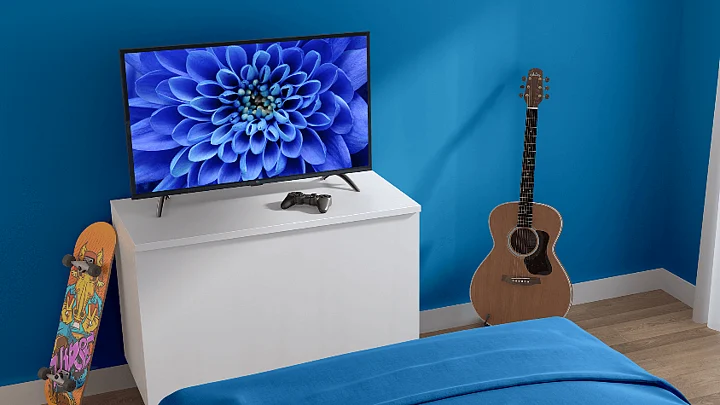Xiaomi has launched a slew of televisions under its Mi TV range for the Indian market over the past few weeks. These televisions are positioned as affordable Smart TVs that support internet, and let you access content from your standard TVs set top box.
The Mi TV range starts from Rs 13,999 and goes up to Rs 40,000, for which you can choose between a 32-inch HD model, 43-inch Full-HD variant and the high-end 55-inch sized television that supports 4K or Ultra-high definition resolution.
It’s more than evident that everyone wants one of these, but which out of the Mi TV 4 and Mi TV 4A should you buy? Let’s make it easy.
Too caught up to read? You can listen to this story instead
Design
With the Mi TV 4, there’s nothing “budget” about how the TV looks – thin, nearly-invisible bezels up front with a thin bar at the bottom edge that houses the infrared receiver. All this is encased in a slim form-factor that goes all the way down to a thinner-than-smartphone 4.9mm. The TV weighs in at 17.8kg (with base), which is definitely on the light side.
Compared to the Mi TV 4, we expect the Mi TV 4A to be less blingy, and the quality of material used might be on the affordable side as well. The Mi TV 4A sized at 43-inch, understandably weighs less than its elder brother at 7.4kg (with base).
All in all, both these TVs carry most of the bulk on the rear side, where all the connectivity ports are stationed, along with the picture tube innards.
Display
As the specs sheet and pricing show, the Mi TV 4 is the better of the two. It gets a big-size 55-inch screen with thin-sized bezels, and that definitely adds to its design appeal. With 4K resolution ie 3840x2160 pixels, Mi TV promises excellent video quality. On the Mi TV 4, the colors are vibrant and high on contrast and saturation levels.
But buyers need to keep their expectations in check. After all, you can’t expect a 40K UHD TV to have quality that matches up to high-end TVs from Samsung and LG.
With the Mi TV 4A, you get a 43-inch sized screen with Full-HD or 1920x1080 pixels resolution. Most televisions with this quality will cost you around Rs 40,000, and except for VU Television’s 43-inch FHD TV at this price, Xiaomi doesn’t really have much to compete with in this segment.
Hardware and Software
Luckily, Xiaomi has stayed true to its value-for-money tradition in the Mi TV range as well. Both these TVs pack the same 64bit quad-core processor that clocks in at 1.5GHz, paired with 1GB and 2GB RAM on the Mi TV 4A and Mi TV 4 respectively. You get 8GB storage onboard as well. For graphics, Mi TV 4A gets Mali-450, while Mi TV 4 supports Mali-T850 unit.
The Indian variants of Mi TV gets less RAM and storage compared to what Xiaomi sells in China. This could have been done to keep the prices lower.
Xiaomi has kept a lot of things common between both these two variants. You get the same software, PatchWall, the same remote to operate between apps on the TV and channels that you’ve subscribed to with Tata Sky or Airtel TV.
The audio duties on the Mi TV 4A have been entrusted with 20W speakers, while Mi TV 4 gets the better deal with DTS-HD Dolby speakers. According to Xiaomi, these speakers have been specifically added for the Indian market, where loud output is a must-have feature.
PatchWall has been customised over Android but the Mi TV 4 series does not support regular Android apps and Google Play store either.
In terms of connectivity, both these TVs are feature-packed, and Xiaomi has made sure that the Mi TV 4A gets even more ports. Mi TV 4 gets one each of USB 2.0, USB 3.0, ethernet (for internet cable) and audio-video (AV) port. The smartness quotient of the TV can be used by connecting the TVs to a Wi-Fi network.
Both TVs come fitted with 3 HDMI ports so that you can connect multiple devices like Chromecast and STBs.
While Mi TV 4A gets 3 USB 3.0, ethernet (LAN cable) and AV port is there too. Frankly, at these prices, you can’t expect more.
Which One Should You Buy?
It all depends how much you want to spend, what size television fits your requirements, and what will be your use-case with this product. If you’re a regular user, then the 43-inch Full-HD variant should be ideal for you.
Feature-wise, both these televisions support smart features like Wi-Fi, ethernet for wired internet, Bluetooth and loads of USB and HDMI ports. The software on board is also the same, offering same set of features and bundled with the same remote unit as well.
We’re hopeful that all these details will help you make the right decision. Televisions, unlike smartphones, aren't replaced every year, so go for a model you’ll enjoy for 3-5 years!
(At The Quint, we question everything. Play an active role in shaping our journalism by becoming a member today.)
